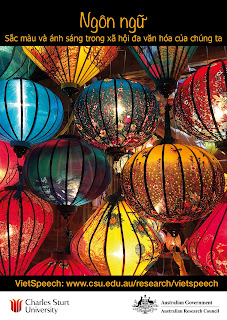Hegarty, N., Titterington, J., McLeod, S., Taggart, L. (2018, in press June). Intervention for children with phonological impairment: Knowledge, practices and intervention intensity in the UK. International Journal of Language and Communication Disorders.
It forms part of Natalie Hegarty's PhD (She is studying at the Ulster University and I am co-supervisor). Congratulations Natalie
Here is the abstract
Background Across the world, research has shown that intervention for children with phonological impairment can be both effective and efficient. However, research has also raised concerns about the translation of this evidence to practice, highlighting questions around clinician knowledge and understanding of approaches, and the intensity of intervention provided within real-life clinical contexts.
Aim To investigate the clinical management of phonological impairment by speech and language therapists (SLTs) in the United Kingdom (UK).
Methods & Procedures An anonymous, UK-wide, online survey was developed using Qualtrics. The target audience were UK-based SLTs who worked with children with phonological impairment. The following topics were explored: (1) SLTs’ understanding of intervention approaches, (2) SLTs’ use of intervention approaches to treat phonological impairment, (3) SLTs’ provision of intervention intensity for children with phonological impairment.
Outcomes & Results A total of 166 responses were analysed. To remediate phonological impairment, SLTs most commonly used speech discrimination (79.5%), conventional minimal pairs (77.3%), phonological awareness therapy (75.6%) and traditional articulation therapy (48.4%). Participants least frequently used the complexity approaches targeting the empty set (82.9%) and 2/3-element clusters (75%) as well as the cycles approach (75.6%). Results also showed that some SLTs were uncertain of what the empty set and 2/3-element clusters approaches entailed. In terms of intervention intensity, participants predominantly provided intervention once per week (69%) for a total of 9-12 sessions (ranging from 5-30 sessions, 71.5%) and elicited targets 10-30 times in single words per session (59.4%) in sessions lasting 21-30 minutes (41.4%).
Conclusions & Implications The most commonly used intervention approaches identified in the current survey (i.e., speech discrimination, conventional minimal pairs and phonological awareness therapy) may be used eclectically by SLTs, which could impact upon the effectiveness and efficiency of treatment for phonological impairment. The current study also highlighted that almost half of participants always/often used traditional articulation therapy to remediate phonological impairment, even though this approach has been found to be less effective for this difficulty. Additionally, it appears that the currently provided intervention intensity for phonological impairment in the UK is significantly lower than what is indicated in the literature. Therefore, a research-practice gap exists for SLTs in the UK working with children with phonological impairment.




















